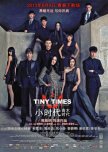
A Strong Second Act That Redeems the First One
I thought the first movie was underwhelming, but the second movie had a much stronger emotional impact and felt like the heart of the story. It’s where the real hardships emerge—some characters face permanent changes in their life or never fully recover. The sequel offered real character growth and life progression, presenting hard choices and life directions in a more grounded, realistic way. I greatly enjoyed it and will definitely be watching the third and fourth installments.Was this review helpful to you?

Underwhelming but Enjoyable
I thought the first movie was underwhelming, but I still enjoyed watching it for the storyline and overall premise. It felt reminiscent of Sex and the City, with a narrative that follows the lives of four girlfriends living in a big city during their college years. You get to know them and their struggles as they begin navigating adulthood. They face disappointments and challenges, many of which are neatly resolved by the end—my biggest critique, since life doesn’t always offer tidy resolutions. Still, it was a refreshing change of pace to watch. And having seen the sequel, I think the first film serves well as an introduction.Was this review helpful to you?

Everyone did great and the story is spectacular, however, the movie is somehow lacking excitement.
This is a crime movie where we have a serial killer on the loose and he is copying a popular Manga, he keep killing a family after another yet each time we only get a glimpse of the dead family and that's it.
The police reaction is so calm, I thought Seida is the only one who has the right to act like that since he is a "peculiar" detective, but everyone is the same.
Not saying it was boring but the "meh!" Vibes of the movie made watch the whole thing with a straight face.
Also I was slightly pissed at why Shun Oguri's character was a supporting role since he literally carried the whole movie and he appeared more than the ML in some parts but I reached the last 20 mins and I understood why!!
Overall great movie you should watch it.
Was this review helpful to you?
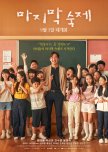
Give me a Hug
It is both realistic and unrealistic to portray a teacher who loves his students so much that he hugs them every day as a greeting. In this movie, we have a teacher who becomes so attached to his small, young students that they become real friends. Of course, this does not go smoothly, because his approach to the students provokes many people—the students themselves, other teachers, and the parents. I liked that this movie reminds us of something we are losing in our society today: the human touch. We are becoming more professional and more distant so that we can do our jobs well, but our relationships suffer. One hug can truly heal a person.The title of the movie, Last Homework, points to the unusual homeworks that the teacher gives his students, which is more about life lessons than solving grammatical or mathematical tasks. I wish there had been more of these assignments in the movie, because they were quite inspirational. Instead, the movie drags a little in the final part in its attempt to evoke emotions from the viewer.
The acting was not top-tier, but it was good enough for this kind of movie. The children deserve special praise for their performances. All in all, this is an educational drama done right.
Was this review helpful to you?
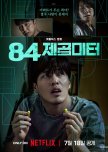
This review may contain spoilers
When you dream becomes a nightmare
Wall to Wall was such a strong film — I enjoyed it all the way through, and it felt painfully realistic. It reflects modern housing struggles so well: buying a flat just to “get your foot onto the property ladder,” only to realise the stress doesn’t stop once you own it.The film really captures how living closely with others can become unbearable, especially with loud neighbours and constant noise that destroys your peace at home. I also liked how it showed the hierarchy between owners and renters, and how status changes the way people treat each other.
One part that really got to me emotionally was when he gambled his money. I was genuinely rooting for him and hoping everything would finally work out so he could pay off his debt, but that choice made the tension feel even heavier.
The story felt like it had two halves, but I stayed fully engaged. Just a warning: there is blood and violence, and things escalate in a dark way. Overall it’s gripping, meaningful, and very relatable.
Highly recommended.
Was this review helpful to you?

entertaining, glad i watched it.
Overall, I found this movie quite entertaining. Originally I was scared off by reviews stating it was slop, but im glad i watched it. The movie is a sequel to a 20 year old TV show, which you probably don't need to watch to understand what is going on, but maybe just understand the basis. It‘s an action movie with a little comedic twist and they even showed clips of his younger self from the first show which was so nice to watch! It was very Interesting watching high tech modern infantry going up against ancient ones aswell. It's also amazing how they got the original cast to play in itWas this review helpful to you?
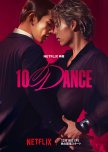
This review may contain spoilers
Quite curious about this. Let’s watch…The story centers on two elite professional dancers who represent opposite worlds of dance. Shinya Suzuki (Suzuki) is the reigning Japanese champion of Latin dance—passionate, raw, and instinctive. Shinya Sugiki (Sugiki) is the Japanese champion and world number two in Standard (ballroom) dance—elegant, disciplined, and stoic.
Despite their rivalry, Sugiki one day proposes that they train each other to compete in the 10 Dance, a grueling competition that requires mastery of all ten disciplines (five Latin and five Standard).
Suzuki scoffs at first. He wants nothing to do with it. But Sugiki knows how to push his buttons. With a sharp, almost provocative attitude, he challenges Suzuki’s lack of ambition on the global stage—questioning whether he’s truly serious or just stuck in the spotlight of national fame. The challenge strikes a nerve and ignites Suzuki’s fierce competitive spirit.
And so begins grueling training—long hours, clashing styles, relentless tension. But as their bodies learn to move in sync, something shifts. The friction isn’t just professional anymore. It becomes electric—physical, emotional, undeniable.
So, will this intense connection grow into something more?
Or in the end, will they remain only rivals—dancing close, but never truly together?
That's pretty much the story without giving anymore spoilers. Now what I like and don't.
What I like:
+ The intense dancing… Haha…
+ The chemistry between the couples…
What I don’t like:
- The ending… Ugh… I hate the ending
- The unclear relationship between them. Like Wing3dBean wrote; everything feels unfinished.
Overall, after watching this, I prefer this more in a drama setting. So we have more time to develop their relationship to the fullest.
Was this review helpful to you?

More pop art than film
Caught in a very awkward disconnect that blends children's fantasy, pocket-sized kaiju and Takashi Murakami's unmistakable superflat aesthetic, Jellyfish Eyes struggles to find a stable footing and becomes so muddled at points that it is all but impossible to discern why anything is happening. The visual design is undoubtedly the film's strongest aspect, with each one of the weird and wacky creatures popping against the muted, almost sterile human environments, but the effects are so lacklustre and stiff that they all become this horrifying blend of adorable concept and nightmarish realisation. At times, the imagery feels closer to an art installation or a horror attraction than a children's film, undoubtedly thanks to the combination of Murakami and Yoshihiro Nishimura's backgrounds in their respective fields. The direction is passable at best, though the camerawork is downright hideous at points; it's clear Murakami has an acute visual sensibility, but a tin ear for expressing human emotion through drama. As a result, much of the film comes off as either insufferably saccharine or strangely out of tune, even with the bright colours. It wants to weave a tale of friendship and loyalty that also addresses humanity's propensity for destruction, but is more often than not let down by its failure to deliver any form of emotional clarity or dip below the candy-coating superficiality of it all. The pacing is slow, exposition-heavy and occasionally opaque, all delivered by a cast of child actors that scream more than they act, although the musical score was fine. Honestly, it's probably better to view Jellyfish Eyes as a failed experiment more than anything else, never fully cohering into a satisfying whole and would have undoubtedly worked better as the anime or horror film it was originally intended to be.Was this review helpful to you?

Just GREAT!
I've already watched this movie twice... It hits me emotionally so much, I think that it is the most emotional Japanese BL I've watched, I love everything in it. I love atmosphere, acting, filming and all those emotions and passion... I couldn't take off my eyes from them dancing and I can't even imagine how much work they had to put in to dance like that. Amazing, beautiful movie, one of the best I\ve watched recently.There is only one thing I don't like in this movie... I wish it would be longer or... it would be a series... I want more... I can't get enough of them...
Was this review helpful to you?

Mean, moody and magnificent
I loved this movie, and most reviews focus on the erotic scenes featuring the smoking hot bar hostess (played by the stunning Mami Fujimura), and on the horrific and difficult to watch train rape scene. However, a less memorable copulatory episode earlier in the movie served the purpose of introducing the unpredictable, aggressive and flawed nature of the Nozawa Shunsuke character (played by the mean, moody and magnificent Ren Osugi). Therefore, it is probably worth a mention in the interests of completeness although the scene pales in comparison to those involving the gorgeous Fujimara.On leaving the bar on conclusion of the opening sequence, Nozawa is scouting a vehicle for temporary use in the hijack he is about to carry out, and soon chances upon a car parked up in a secluded backstreet location. At this point we are presented with an overly-long and drawn out seduction and lovemaking session involving a sleazy married commuter who has managed to coax a naïve and top-heavy high school girl from the subway train back to his parked car.
“Nice tits” quips this smooth operator with a smirk, as he nonchalantly removes the bra and panties from the submissive girl. By the time Nozawa arrives on the scene, the short-lived romance is being vigorously consummated, and the girl is so overcome with passion that she does not notice the short-tempered Nozawa ominously striding up to the vehicle, pistol in hand. The shocked girl is then confronted with the black-leather clad Nozawa tapping on the window and demanding that she get out immediately. Apparently feeling that the confused girl did not respond fast enough to his command, Nozawa grabs the girl roughly by the hair and brutally pistol-whips her, before brutally dragging her out of the car and depositing the partially-clothed girl on the concrete with about as much care as he would dump a bag of trash.
It is worth noting that our hero treated the romeo who had been exploiting the girl’s naivety much less harshly, with an almost apologetic Nozawa explaining that he would leave the car undamaged and in an easy to find location once he has finished with it. The scene is purposeful as it dropped a hint to the viewer at an early stage not to get too emotionally attached to the male lead, although later we do see a more compassionate side of Nozawa, particularly regarding his doomed relationship with the beautiful Rinko.
Was this review helpful to you?

This review may contain spoilers
My January 2026 recommendation
Watched this for my Recommendation Challenge from 𝑲𝒂𝒕𝒆. Let’s talk movie…The story centers on Wei Yihang (YH), a cynical and reclusive teenager who has undergone brain surgery for a tumor. Living in constant fear of a relapse, he gradually distances himself from the world—and even from his own parents—to avoid causing them further pain. Seeing himself as a burden, YH chooses to retreat into his own isolated bubble.
His life begins to change when he meets Ma Xiaoyuan (XY), a bright, optimistic girl who also had brain cancer. Unlike YH, XY embraces every moment of her life, firmly believing that even a limited lifespan should be lived to the fullest.
At first, YH tries to push XY away. However, her warmth, optimism, and unwavering positivity slowly break through his defenses. XY teaches him how to see the world differently, encouraging him to find joy and meaning again.
XY even teaches YH to dream again.
They travel—to Paris, to the sea, to faraway skies—all within their imagination, yet feeling more real than anything else.
For a while, everything feels peaceful and perfect… until it doesn’t.
So what happens next?
Will their illnesses return, or will they be granted the happy ending they both long for?
That's pretty much the story without giving anymore spoilers. Now what I like and don't.
What I like:
+ This movie teach us how to find the positivity even in the dark moment
+ The amazing family YH had. Seeing how his entire big family support YH’s dad for his treatment is something we rarely see in dramas or even in real life
+ Amazing acting from every actor(ess) involved. We can see the pain in YH’s parent's faces, the despair in YH’s eyes or the positivity in XY.
What I too like:
- A little boring at first. But If you’re just a little bit patient you get the prize in the end. Haha…
Overall this is one of the good movies to watch.
Was this review helpful to you?

Understands loneliness better than most films bother to try
I don't think a film has ever left me smiling and laughing, then shifting to uncontrollable sobbing, so many times before. There was a particular point in Rental Family wherein Brendan Fraser's character is asked if he'd ever consider using the same service he's providing to so many other people; it really got me thinking about how much I miss members of my own family and what I wouldn't give to see them again, however brief, for one more time. It understands loneliness better than most films bother to try. There's a beautiful sense of heart and deep emotional love at its core, daring to ask what it really means to interact with fellow humans and how the roles we play in life shape our reality and our perception of it. It all bathes in a subdued light: low lamps, quiet kitchens, rainy streets that blur into bokeh, Tokyo is a presence, not oppressive, just honest, a city of people close yet worlds apart. Hikari directs the film with a wonderful amount of softness, offering the comfort of a warm hug within, never becoming overly melodramatic or heavy-handed as it's all handled with tenderness and careful thought. It doesn't try to be revolutionary in its storytelling, yet for this reason, the depth of human connection we witness is tremendous. Brendan Fraser is simply phenomenal, chewing through scenes with masterful restraint. He doesn't demand the spotlight or steal scenes from equally exceptional co-stars; he elevates those around him with emotional quietness. An endearing tour of empathy, compassion and a glimpse of humanity at its best, yet equally so quietly devastating, Rental Family serves as a small yet meaningful reminder of the importance of kindness and human connection in a world that seems to be losing both.Was this review helpful to you?

Was this review helpful to you?
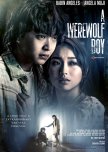
This review may contain spoilers
A Howling Success for RabGel
I’ve just stepped out of the block screening of A Werewolf Boy, and I walked away genuinely impressed. This 2026 Philippine fantasy romance, produced by Viva Films, Studio Viva, and CJ ENM, is an official remake of the beloved 2012 South Korean film starring Song Joong-ki and Park Bo-young. While it’s not an original story, this local adaptation confidently stands on its own, offering a polished, emotionally grounded adaptation that stands confidently on its own.The film follows Sara, a teenage girl who moves to the countryside with her family and discovers a mysterious, feral boy hiding on their land. He’s unable to speak, driven by instinct, and clearly not like anyone she’s ever met. Instead of fear, Sara responds with patience and kindness, slowly teaching him how to eat, behave, and connect with others. What begins as curiosity grows into a tender, unconventional romance shaped by trust, care, and quiet understanding. As their bond deepens, outside forces—including an entitled and dangerous suitor—threaten their fragile world, pushing both characters toward difficult choices rooted in love and sacrifice.
What could have felt uncomfortable is handled with surprising care. Boy’s dog-like devotion is framed as emotional intimacy, not ownership. Their shared moments are soft, ordinary, and disarmingly gentle, and that’s where the film truly shines. This isn’t a werewolf movie driven by horror tropes or jump scares. There are no mystery deaths or fear-fuelled twists. Instead, A Werewolf Boy chooses connection over spectacle, tenderness over terror. It’s emotional without being manipulative — yes, it made me cry — but it’s also warm, comforting, and quietly uplifting.
Directed by Crisanto B. Aquino, known for My Future You and Instant Daddy, the film marks a confident genre shift for him. His direction feels steady and intentional, balancing fantasy elements with intimate emotional beats. Rabin Angeles headlines the film as the wolf boy in his first leading role, opposite Angela Muji as Sara. Candy Pangilinan is a delight as Sara’s warm and humorous mother, Aling Rosa, while Albie Casiño is impressively effective as Jojo, the arrogant and abusive antagonist. Lorna Tolentino’s special participation as the older Sara adds emotional weight and gravitas, reminding us why she remains one of the country’s most respected actresses.
Even without having seen the original Korean film (which I now fully intend to watch), this adaptation works beautifully on its own. In terms of acting and overall execution, it really delivers. Candy Pangilinan is effortlessly funny, Albie Casiño is so convincing as the villain that he genuinely gets under your skin, and Lorna Tolentino brings depth and restraint that elevate every scene she’s in. Beyond performance, the film excels in how carefully and thoughtfully the Korean story is translated into a Filipino context. The adaptation feels meticulous rather than mechanical.
Angela Muji and Rabin Angeles truly step up here. Having seen them in lighter or more commercial projects before, this feels like their strongest work yet, both individually and as a pair. Their chemistry is natural and unforced, and even the simplest scenes carry emotional weight. Rabin takes on a particularly challenging role with no spoken dialogue, relying on physicality, expressive eyes, and silence to convey longing and vulnerability. Angela brings warmth and sincerity to Sara, making her easy to root for from the very beginning. If this film is meant to introduce them as a love team, it’s a smart and promising launch.
From start to finish, the film’s pacing is smooth and engaging. Nothing feels rushed or out of place, and the storytelling allows emotional moments to breathe. The visual effects are used sparingly and effectively, enhancing the supernatural elements without overwhelming the narrative. The supporting cast adds texture and balance, making the world feel lived-in and emotionally complete.
There are minor stumbles, particularly with period consistency. While the story suggests a setting somewhere between the 1960s and 1970s, some language and technology choices don’t always line up perfectly. These details are noticeable but ultimately forgivable, functioning more as small distractions than real flaws.
Overall, A Werewolf Boy is a well-crafted Filipino adaptation that honours its Korean predecessor while carving out its own identity. It’s tender without being cloying, emotional without being manipulative, and polished without losing its heart. If you’re a fan of fantasy romance or simply enjoy stories about love, belonging, and quiet connection, this one is well worth watching.
Was this review helpful to you?
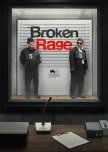
This review may contain spoilers
Just watch it lmao
Honestly the best way to explain this is, the first half is the narrow and straight. Then the last half is just hilarious nonsense. Not all of it will hit good. But the really funny bits are classic Kitano. The plot is basically told twice but with comedic changes in the second half.Honestly first part isn't even that bad pretty simple gangsta setup lol
Kinda reminded me of like improv shows. You could tell the actors were having fun with the constant snickering. I've never seen Tadanobu Asano act like this before haha so it was ever funnier.
If you like Kitano and to waste a random hour, why not lol
Was this review helpful to you?
Recent Discussions
-

-
Add GagaOOLala to lists of services1 hour ago
-
 BL Drama Lovers Club1 hour ago
BL Drama Lovers Club1 hour ago -
 Your suspects are … ?1 hour ago
Your suspects are … ?1 hour ago -



